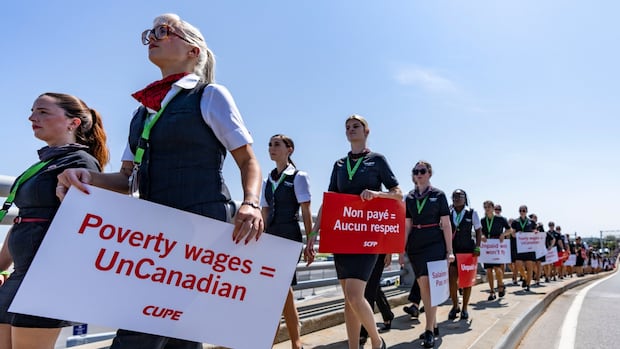The federal government is intervening to resolve a labour dispute between Air Canada and the union representing its flight attendants.
Jobs Minister Patty Hajdu said she has invoked Section 107 of the Canada Labour Code to allow binding arbitration between the airline and its union and has ordered operations to resume — although it’s not immediately clear when the 10,000 flight attendants would return to work.
Ottawa’s involvement came Saturday afternoon, after the union representing Air Canada flight attendants said no talks were scheduled with the airline as of that morning.
The union and airline met late Friday night before the flight attendants walked off the job at 12:58 a.m. ET, Wesley Lesosky, president of the Air Canada component of the Canadian Union of Public Employees (CUPE), told a morning news conference.
Lesosky said their last meeting was Friday night, but Air Canada offered “nothing of substance” to bring back to members.
Asked when Canadians could expect to be back on flights, Lesosky said it’s up to Air Canada, but that public pressure on the airline will make a “huge difference” in reaching a settlement.
CBC News has reached out to Air Canada for comment and will update this story with any response.
“It is unacceptable that such little progress has been made. Canadians are counting on both parties to put forward their best efforts,” Hajdu said earlier on Saturday on social media platform X.
Please see my statement on the latest development between CUPE Flight Attendants at Air Canada and Air Canada:<br>//<br>Voici ma déclaration sur les derniers développements entre les agents de bord du SCFP d’Air Canada et Air Canada : <a href=”https://t.co/vYTuFThYgg”>pic.twitter.com/vYTuFThYgg</a>
—@PattyHajdu
Picket lines set up across Canada
All Air Canada and Air Canada Rouge flights are suspended for now. Around 130,000 customers will be affected each day the strike continues, said the airline.
Flights by Air Canada Express, which are operated by third-party airlines Jazz and PAL, are not affected.
- Cross Country Checkup is asking: How have you been affected by the Air Canada strike? What should be done about it? Leave your comment here and we may read it or call you back for our show on Sunday.
“Air Canada deeply regrets the effect the strike is having on customers,” it said in a brief statement early Saturday morning.
CUPE has set up picket lines at airports across Canada, including in Montreal, Toronto, Calgary and Vancouver. Striking flight attendants also plan to picket at airports in Halifax, Ottawa and Winnipeg.
In the meantime, passengers around the world are feeling the effects of the flight attendants’ strike.
Keelin Pringnitz and her family are from Ottawa and were returning from a European vacation, but were left stranded after flights were cancelled.
“It was an end of my maternity leave kind of trip. We went to the Faroe Islands and Norway, travelling through Air Canada to London,” Pringnitz said from London’s Heathrow Airport.
She noted there was an option for travellers to go the U.S. but she and others were told there wouldn’t be any further assistance once they landed in the U.S.
“It didn’t go over well with the line. Nobody really seemed interested, everybody seemed a little bit amused almost at the suggestion, or exasperated, because it is a bit ridiculous to offer to take stranded passengers to a different country to strand them there.”
For customers due to travel soon whose flights are not yet cancelled, Air Canada said it will allow them to rebook their travel or obtain a credit for future travel.
Sides at an impasse on pay
Air Canada and CUPE have been in contract talks for about eight months but have yet to reach a tentative deal.
Both sides say they remain far apart on the issue of pay and the unpaid work flight attendants do when planes aren’t in the air.
More than 10,000 Air Canada flight attendants went on strike early Saturday morning, after the airline and the union representing them failed to reach a deal ahead of the deadline. With a work stoppage now in effect, Air Canada estimates that 130,000 customers will be affected each day of a strike, a figure that includes 25,000 Canadian travellers who are abroad.
The airline’s latest offer included a 38 per cent increase in total compensation, including benefits and pensions over four years, that it said “would have made our flight attendants the best compensated in Canada.”
But the union pushed back, saying the proposed eight per cent raise in the first year didn’t go far enough because of inflation.
Government intervention
Air Canada previously asked Hajdu to intervene by ordering the parties to enter a binding arbitration process — a power granted to the minister through Section 107 of the Canada Labour Code.
On Friday, Hajdu urged Air Canada and the union to get back to the negotiating table, suggesting she’s not ready to intervene. The minister said the union has indicated many of its demands have been met, suggesting there is a path forward to a deal.
Hajdu had asked the union to respond to the company’s request. CUPE indicated Friday it opposed arbitration, instead maintaining its desire to solve the impasse through bargaining.
Canada’s largest airline is now mostly grounded after a strike deadline passed for more than 10,000 Air Canada flight attendants. Hundreds of flights have been cancelled impacting over 100,000 travellers and leaving some stranded.








